
Dental Laminates in Jaunpur
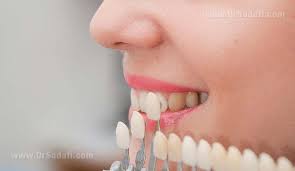
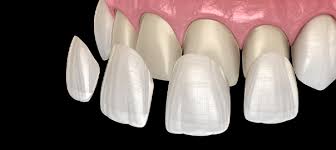
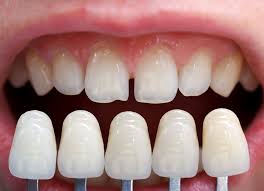
What do you mean by Dental Laminates
Dental laminates, also known as dental veneers or porcelain veneers, are thin custom-made shells of tooth-colored material designed to cover the front surface of teeth. They are used to improve the appearance of teeth that are discolored, stained, chipped, misaligned, or irregularly shaped. Dental laminates are a popular cosmetic dentistry option to enhance a person’s smile and achieve a more aesthetically pleasing appearance.



Types of Dental Laminates
Types of Dental Laminates:
Porcelain Veneers: These are the most common type of dental laminates. They are crafted from a durable ceramic material that closely resembles the appearance of natural teeth.
Composite Veneers: Made from a tooth-colored resin material, these veneers are directly applied to the teeth and shaped by the dentist. They are more affordable than porcelain veneers but tend to be less durable and may require more maintenance.
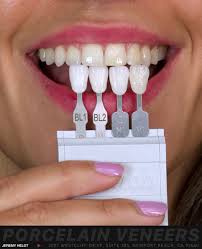
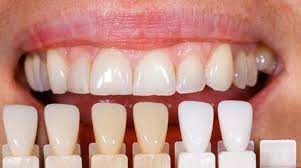
Advantages of Dental Laminates
Advantages of Dental Laminates:
Aesthetic Improvement: Dental laminates can dramatically enhance the appearance of teeth, correcting various imperfections and creating a natural, beautiful smile.
Stain Resistance: Porcelain veneers are highly resistant to staining, allowing the smile to remain bright and attractive over time.
Minimal Tooth Alteration: The preparation process for dental laminates usually requires minimal removal of tooth structure compared to other cosmetic dental procedures like crowns.
Durable: Porcelain veneers are strong and can last for many years if properly cared for.
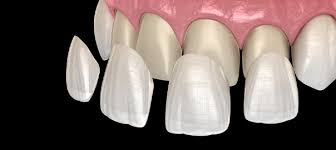

Disadvantages of Dental Laminates
Disadvantages of Dental Laminates:
Cost: Dental laminates, especially porcelain veneers, can be expensive, and they may not be covered by dental insurance since they are primarily considered a cosmetic procedure.
Irreversible: The process of preparing teeth for laminates involves removing a small amount of enamel, and this is irreversible. The teeth will always require some form of restoration to protect them.
Sensitivity: Some patients may experience increased tooth sensitivity after the enamel removal process, although this is usually temporary.
Potential Damage: While dental laminates are durable, they can still chip or break if subjected to excessive force, such as biting on hard objects or trauma.
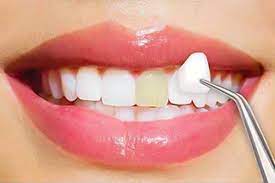
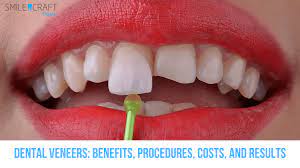
Procedures of Dental Laminates
Steps Involved in Getting Dental Laminates:
Consultation: The first step is a consultation with a dentist. The dentist will assess your teeth, discuss your goals, and determine whether dental laminates are the right option for you.
Tooth Preparation: A small amount of enamel, usually about 0.5mm, is removed from the front surface of the teeth to create space for the veneers.
Impressions: Impressions of the prepared teeth are taken and sent to a dental lab, where the veneers are custom-made to match the desired size, shape, and color.
Temporary Veneers: While the permanent veneers are being crafted, temporary veneers may be placed to protect the prepared teeth and maintain aesthetics.
Bonding: Once the permanent veneers are ready, the dentist checks their fit and appearance. The veneers are then bonded to the teeth using a dental adhesive and a curing light.
Final Adjustments: The dentist makes any necessary final adjustments to ensure the veneers fit perfectly and feel comfortable.
Maintenance: Regular oral hygiene practices and routine dental check-ups are important to ensure the longevity of the veneers.
Get In Touch

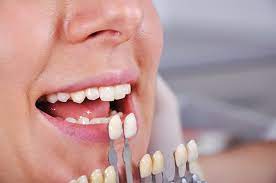
Candidate for porcelain veneers: individuals with a history of tooth decay
Porcelain veneers are thin shells of porcelain that are custom-made to fit over the front surface of a tooth. They are commonly used in cosmetic dentistry to improve the appearance of teeth that are discolored, misaligned, chipped, or have other aesthetic imperfections. A candidate for porcelain veneers typically includes individuals who:
Have Dental Imperfections: Candidates should have cosmetic issues with their teeth that they wish to address, such as stains, discoloration, cracks, chips, gaps, or unevenness.
Good Oral Health: Candidates should have generally good oral health, without significant issues like untreated cavities, gum disease, or other major dental problems. Any underlying dental health issues should be addressed before considering veneers.
Healthy Tooth Enamel: The process of applying veneers involves removing a small amount of the tooth’s enamel to make space for the veneer. Candidates should have sufficient enamel for this process.
Sufficient Tooth Structure: There needs to be enough tooth structure remaining after enamel removal to support the veneer. In cases where the tooth is severely damaged or compromised, other dental treatments may be more appropriate.
Realistic Expectations: Candidates should have realistic expectations about the outcome of the treatment. While veneers can provide significant cosmetic improvement, they may not be able to address all dental issues. A thorough consultation with a dentist can help manage expectations.
Commitment to Oral Hygiene: Good oral hygiene practices are essential to maintain the health of both natural teeth and veneers. Candidates should be willing to follow recommended oral hygiene routines.
Non-Grinding Habits: Individuals who grind their teeth (bruxism) excessively might not be suitable candidates as the grinding could damage the veneers. In such cases, addressing the bruxism issue may be necessary before considering veneers.
Stable Bite: Candidates should have a stable bite, as excessive bite issues could put extra pressure on the veneers and potentially lead to damage.
No Smoking or Heavy Alcohol Consumption: Smoking and heavy alcohol consumption can affect the longevity and appearance of veneers. Candidates should be willing to reduce or eliminate these habits.
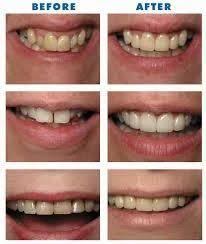
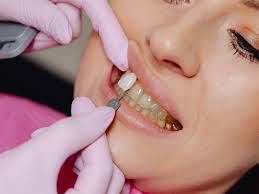
How do I care for Porcelain veneers?
Caring for porcelain veneers is essential to ensure their longevity and maintain their appearance. Porcelain veneers are thin, custom-made shells that are bonded to the front surface of your teeth to improve their appearance. Here’s how you can care for them:
Maintain Good Oral Hygiene: Brush your teeth at least twice a day with a soft-bristle toothbrush and fluoride toothpaste. Use a gentle technique to avoid putting excess pressure on the veneers. Floss daily to clean between your teeth and maintain healthy gums.
Avoid Abrasive Toothpaste: Choose a non-abrasive toothpaste, as abrasive ones can scratch the surface of the veneers over time, leading to dullness and potential damage.
Avoid Staining Foods and Drinks: Porcelain veneers are resistant to staining, but it’s still a good idea to minimize consumption of foods and beverages that can cause staining, such as coffee, tea, red wine, and dark-colored sauces. If you do consume staining substances, try to rinse your mouth with water afterward.
Quit Smoking: Smoking can stain your teeth and veneers, and it’s also detrimental to your overall oral health. If you smoke, consider quitting for the sake of your veneers and your general well-being.
Limit Acidic Foods and Drinks: Acidic foods and drinks can erode the protective layer of your veneers, leading to potential damage. Citrus fruits, carbonated beverages, and vinegar-based foods are examples of acidic substances to consume in moderation.
Use a Mouthguard for Grinding: If you have a habit of grinding or clenching your teeth, especially during sleep, consider using a night guard. Grinding can put excessive pressure on your veneers and lead to chipping or cracking.
Protect Your Teeth During Sports: If you engage in contact sports or any activities that could potentially damage your teeth, wear a mouthguard to protect both your natural teeth and your veneers.
Regular Dental Check-ups: Maintain regular visits to your dentist for check-ups and professional cleanings. Your dentist can monitor the condition of your veneers and address any issues before they worsen.
Avoid Using Teeth as Tools: Don’t use your veneers or natural teeth to open packages, bottles, or bite into hard objects. This can lead to chipping or breaking.
Communicate with Your Dentist: If you notice any changes in the appearance or comfort of your veneers, contact your dentist promptly. It’s better to address any issues early to prevent more extensive problems.
